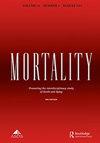“黑暗中的光”,第1部分:儿童死亡后与医疗保健从业人员有效沟通的特征
IF 0.7
0 HUMANITIES, MULTIDISCIPLINARY
引用次数: 1
摘要
本文章由计算机程序翻译,如有差异,请以英文原文为准。
‘Lights in the darkness’, part 1: characterising effective communication with healthcare practitioners following the death of a child
ABSTRACT In this two-part article, we investigate communication with parents following the death of a child. Parents who have lost a child need to communicate with a wide range of professionals, and the quality of the communication that parents have with these groups can radically affect their experience of bereavement. In this UK-based interview study, we investigate why particular types of communication are deemed particularly (in)effective, by examining them in the light of parents’ descriptions of the experience of loss. In this first part of the article, we report findings from our in-depth content analysis of these interviews, discussing the ways in which the death of a child was experienced and then exploring the parents’ accounts of the communication they had with healthcare professionals involved. In the second part of the article, published in a subsequent issue of this journal, we consider the wider network of professionals with whom parents may come into contact following the death of a child. We conclude by discussing the ways in which effective care and communication resonates with, and takes account of, the experiences of the bereaved.
求助全文
通过发布文献求助,成功后即可免费获取论文全文。
去求助
来源期刊

Mortality
Arts and Humanities-Religious Studies
CiteScore
1.80
自引率
12.50%
发文量
42
期刊介绍:
A foremost international, interdisciplinary journal that has relevance both for academics and professionals concerned with human mortality. Mortality is essential reading for those in the field of death studies and in a range of disciplines, including anthropology, art, classics, history, literature, medicine, music, socio-legal studies, social policy, sociology, philosophy, psychology and religious studies. The journal is also of special interest and relevance for those professionally or voluntarily engaged in the health and caring professions, in bereavement counselling, the funeral industries, and in central and local government.
 求助内容:
求助内容: 应助结果提醒方式:
应助结果提醒方式:


